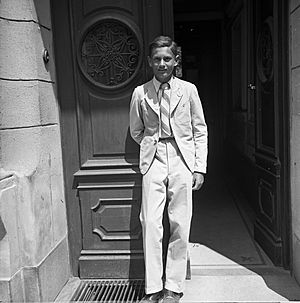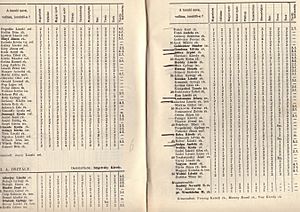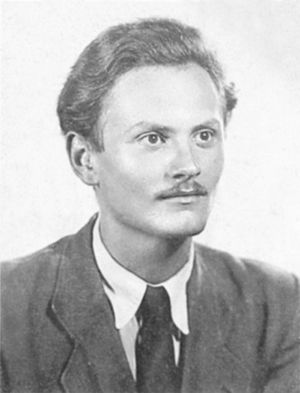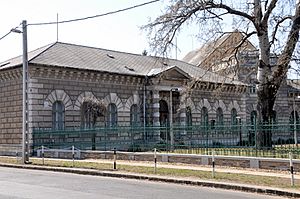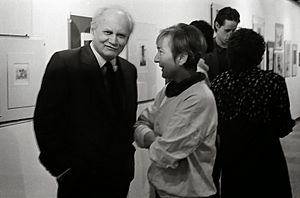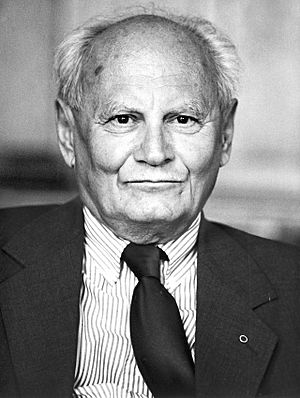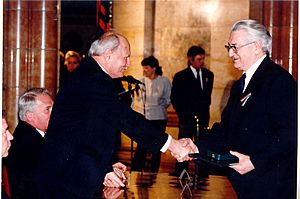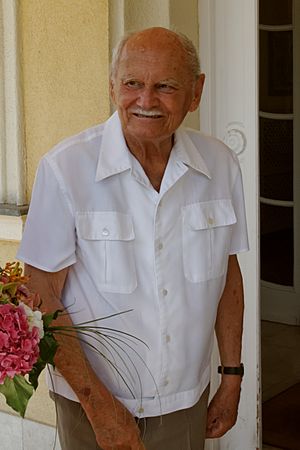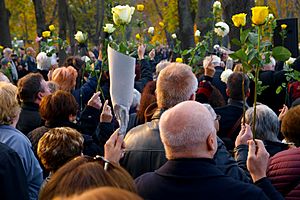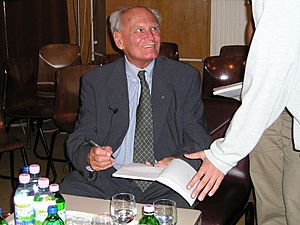Árpád Göncz facts for kids
Quick facts for kids
Árpád Göncz
|
|
|---|---|
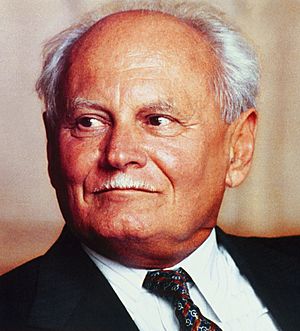
Göncz in 1999
|
|
| President of Hungary | |
| In office 2 May 1990 – 4 August 2000 |
|
| Prime Minister |
|
| Preceded by | Mátyás Szűrös (interim) |
| Succeeded by | Ferenc Mádl |
| Speaker of the National Assembly | |
| In office 2 May 1990 – 3 August 1990 |
|
| Preceded by | István Fodor |
| Succeeded by | György Szabad |
| Member of the National Assembly | |
| In office 2 May 1990 – 3 August 1990 |
|
| Personal details | |
| Born | 10 February 1922 Budapest, Kingdom of Hungary |
| Died | 6 October 2015 (aged 93) Budapest, Hungary |
| Political party |
|
| Spouse |
Zsuzsanna Göntér
(m. 1947) |
| Children | 4, including Kinga |
| Parent |
|
| Alma mater | Pázmány Péter University |
| Profession |
|
| Signature | |
| a. | |
Árpád Göncz (born 10 February 1922 – died 6 October 2015) was a Hungarian writer, translator, and politician. He served as the President of Hungary from 1990 to 2000. Göncz was a key figure in Hungary's journey from communism to democracy.
He was also a founding member of the Alliance of Free Democrats (SZDSZ). Before becoming president, he was the Speaker of the National Assembly of Hungary. He was Hungary's first freely elected head of state after many years of communist rule.
Contents
- Biography
- Personal Life
- Death and Funeral
- Awards and Honours
- See also
Biography
Early Life and Education (1922–1945)
Árpád Göncz was born in Budapest, Hungary, on 10 February 1922. His father, Lajos Göncz, was a post officer and a tennis player who competed in the 1924 Summer Olympics. Árpád's parents divorced when he was six.
He attended Werbőczy Secondary Grammar School starting in 1932. There, he joined the Hungarian Scout Association. Scouting helped him understand social issues, especially the challenges faced by poor farmers. He also joined the Pál Teleki Work Group, which was a forum for university students. This group focused on the importance of the nation, family, and community.
Göncz studied law at the Budapest Pázmány Péter University of Arts and Sciences, graduating in 1944. During World War II, Hungary was occupied by Germany. Göncz joined the resistance movement against the Nazi regime. He took part in actions against the Arrow Cross regime in Budapest. After the war, he continued his studies in agricultural science.
Early Political Steps (1945–1956)
After World War II, Göncz joined the Independent Smallholders' Party (FKGP). This party won the 1945 parliamentary election. However, the Soviet Union influenced the government, ensuring communists had key roles. Göncz worked as a personal assistant to Béla Kovács, the party's General Secretary. He also edited the party's weekly newspaper, Nemzedék (meaning "Generation").
The Communist Party gradually weakened other parties. In 1947, Béla Kovács was arrested and taken to the Soviet Union. Göncz was also arrested for a short time. By 1949, the FKGP was absorbed into a communist-led alliance, and Göncz lost his job. He then worked as a manual laborer and studied agricultural science. He became an agronomist, focusing on soil improvement, until the 1956 Hungarian Revolution.
The 1956 Revolution and Its Aftermath (1956–1957)
Göncz was active in the Petőfi Circle, a group of intellectuals who discussed reforms. He criticized the Soviet agricultural model, saying it wasn't right for Hungary. On 23 October 1956, he joined a peaceful protest in front of the Hungarian Parliament Building.
During the revolution, Göncz worked with the Hungarian Peasant Alliance. He supported the political ideas of Prime Minister Imre Nagy. After the Soviet intervention on 4 November 1956, Göncz helped write protests against the invasion. He also helped send a manuscript by Imre Nagy out of the country, hoping it would help save Nagy from execution.
Years in Prison (1957–1963)
Göncz was arrested on 28 May 1957. He was accused of trying to overthrow the state. On 2 August 1958, he was secretly tried and sentenced to life imprisonment. He believed that international efforts, possibly from India, helped him avoid the death penalty.
He spent his prison years in Budapest and later in Vác. In Vác, conditions were a bit more relaxed. He learned to read and write English. He also translated books, including parts of The Forsyte Saga. This helped him prepare for his future career as a translator. In 1960, he took part in a hunger strike to protest that political prisoners were not being pardoned. In July 1963, Göncz was released from prison as part of a general amnesty.
Literary Career (1963–1988)
After his release, Göncz became a well-known translator and writer. He translated over a hundred books from English into Hungarian. Some of his famous translations include Ragtime by E. L. Doctorow and Frankenstein by Mary Shelley.
His most famous translation work is J. R. R. Tolkien's The Lord of the Rings trilogy. He worked on the prose, while Dezső Tandori translated the poems. The book was published in Hungary for the first time in 1981. Göncz also translated works by William Faulkner, Ernest Hemingway, and William Golding.
His own writings include novels and plays like Men of God (1974) and Magyar Médeia (1976). He also wrote essays and short stories. He worked very hard, often for ten hours a day. He received the Attila József Prize in 1983 and the Wheatland Prize in 1989. From 1989 to 1990, he was President of the Hungarian Writers' Union.
Return to Politics (1988–1990)
In the late 1980s, Hungary's communist government was facing problems. Árpád Göncz became involved in new political movements. In 1988, he helped found the Historical Justice Committee (TIB). This group wanted to correct the official communist view of the 1956 revolution. They also pushed for a proper reburial of Imre Nagy and others who were executed.
Göncz protested against police actions that broke up peaceful demonstrations. He also helped organize the reburial ceremony for Imre Nagy in 1989. This event was a major step towards democracy in Hungary. Göncz officially opened the ceremony.
He was also a co-founder of the Alliance of Free Democrats (SZDSZ) in 1988. This party became a major anti-communist force. In the first free parliamentary election in March 1990, the Hungarian Democratic Forum (MDF) won. The SZDSZ came in second. The MDF and SZDSZ made an agreement. The SZDSZ could nominate a candidate for President of Hungary. Árpád Göncz was chosen.
On 2 May 1990, Göncz was elected Speaker of the National Assembly. As Speaker, he served as Acting President until the presidential election in August.
Presidency (1990–2000)
| Göncz's political activities and role during his presidency (1990–2000) | |||
|---|---|---|---|
| Presidential activities | 1990–1994 (Antall–Boross) | 1994–1998 (Horn) | 1998–2000 (Orbán I) |
| Parliamentary speeches | 22 | 4 | 2 |
| Foreign trips (days) | 49 (215) | 79 (273) | 35 (119) |
| Signing international treaties | 1 | – | – |
| Initiating referendums | – | – | – |
| Self-proposed laws | 5 | – | – |
| Initiating extraordinary parliamentary sessions | – | – | – |
| Participating in parliamentary sessions | 71 | 15 | 12 |
| Constitutional vetoes | 7 | – | 1 |
| Political vetoes | – | 2 | – |
| Political role | 1990–1994 (Antall–Boross) | 1994–1998 (Horn) | 1998–2000 (Orbán I) |
| Pro-President parties | SZDSZ (MDF) |
MSZP SZDSZ |
MSZP SZDSZ |
| Parliamentary majority | Right-wing (MDF–FKGP–KDNP) |
Left-wing (MSZP–SZDSZ) |
Right-wing (Fidesz–FKGP–MDF) |
| Perception of presidential role | Counterbalance | Supportive/Symbolic | Symbolic |
| Conflicts with government | Frequent | Minimal | Rare |
| Activity in daily politics | Significant | Diminished | Diminished |
| Political weight | Medium/Strong | Weak | Weak |
First Term as President (1990–1995)
On 4 August 1990, Árpád Göncz was elected President of Hungary by the National Assembly. He became Hungary's first democratically elected head of state in decades. In his first speech, he promised to serve the nation and protect human rights. He said he would not be a servant of any single party.
Göncz strongly supported Hungary joining Western organizations like NATO and the European Union. He welcomed important visitors to Hungary, including Prince Charles and Diana, Princess of Wales in 1990, and Elizabeth II in 1993. In 2000, he received the Vision for Europe Award for his work towards a united Europe.
His relationship with Prime Minister József Antall was sometimes difficult. Göncz often acted as a check on the government's power. For example, during the "taxi-blockade" in October 1990, when taxi drivers protested rising fuel prices, Göncz helped mediate between the government and the drivers. He also prevented the use of military force.
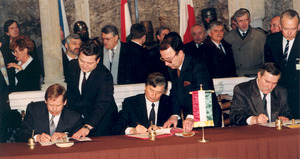
Göncz also had disagreements over new laws. He sent the Law on Compensation, which aimed to help victims of the communist regime, to the Constitutional Court for review. He also refused to sign the "Zétényi–Takács Law," which would have removed the time limit for prosecuting communist political crimes. Göncz believed in avoiding social division and protecting the rule of law. He did not want to see laws used for political revenge.
In October 1992, Göncz faced protests at a national day ceremony. Some people booed him because they disagreed with his decisions on certain laws. He was unable to give his speech. This event highlighted the political tensions of the time.
Göncz also had a major conflict with the government over control of state media. He refused to approve new leaders for state television and radio, arguing that it would harm democracy. The Constitutional Court ruled that the President should sign appointments within a reasonable time. This "media war" showed the challenges of establishing new democratic institutions.
Second Term as President (1995–2000)
In May 1994, the Hungarian Socialist Party won the parliamentary election. They formed a coalition with the Alliance of Free Democrats. On 19 June 1995, Göncz was re-elected for a second five-year term as president.
During his second term, Göncz's role became less active. This was partly because his health declined, and also because the President's constitutional role became clearer. The Constitutional Court often ruled in favor of the Prime Minister, which led Göncz to adopt a more ceremonial role.
In 1995, Göncz approved the "Bokros package," a series of economic measures aimed at stabilizing the country. He believed these steps were necessary to prevent economic collapse. He also had some disagreements with the government over laws related to privatization and the separation of political and economic interests.
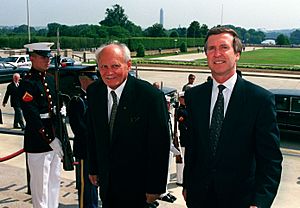
One notable event was his decision to grant a presidential pardon to Péter Kunos, a banker convicted of corruption, in 1998. The Minister of Justice refused to release Kunos, leading to a public debate. Göncz explained his decision was based on human grounds and the legal process.
Later Life (2000–2015)
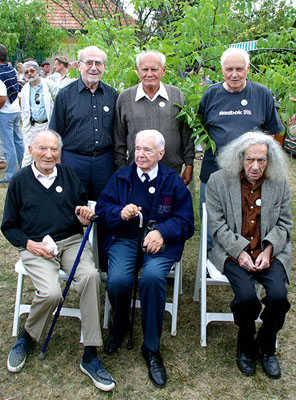
Árpád Göncz finished his second term on 4 August 2000. He was succeeded by Ferenc Mádl. In his farewell speech, Göncz said he had tried to ensure that the democratic state was "people-oriented."
After his presidency, Göncz retired from politics. He became President of the Hungary in Europe Foundation. In November 2000, he was made an honorary citizen of Budapest. In April 2003, he attended the ceremony for Hungary joining the European Union in Athens, Greece. He also spoke at political forums and called for the release of political prisoners in Cuba.
On his 90th birthday in 2012, hundreds of people celebrated him with serenades and speeches. The President of Hungary, Pál Schmitt, also called to wish him well.
Personal Life
On 11 January 1947, Göncz married Mária Zsuzsanna Göntér. They had four children: two sons, Benedek and Dániel, and two daughters, Kinga and Annamária. His daughter, Kinga Göncz, later became a politician and served as Minister of Foreign Affairs. In 2012, his children created the Göncz Árpád Foundation to preserve his legacy and promote democratic values.
Death and Funeral
Árpád Göncz passed away on 6 October 2015, in Budapest, at the age of 93. Hungarian lawmakers held a minute of silence in parliament. Many politicians and parties, from across the political spectrum, expressed their condolences and respect for his life and work. Thousands gathered at Kossuth Square to mourn him.
Foreign media also remembered Göncz. The New York Times called him "widely beloved" by Hungarians, who affectionately called him "Uncle Árpi." The President of the European Commission, Jean-Claude Juncker, described him as a "democrat" and a "true European."
Following his wishes, Göncz was buried without official state or military honors. His funeral took place on 6 November 2015, at the Óbudai cemetery, near his friends from the 1956 revolution. The ceremony included speeches and songs, honoring his life and contributions to Hungary.
Awards and Honours
- 1991: Italy – Grand Cross of the Order of Merit of the Italian Republic
- 1991: United Kingdom – Knight Commander of the Order of St Michael and St George
- 1994: Poland – Order of the White Eagle
- 1994: Spain – Collar of the Order of Civil Merit
- 1995: Malta – Honorary Companion of Honour with Collar of the National Order of Merit
- 1999: Estonia – Collar of the Order of the Cross of Terra Mariana
- 1999: Lithuania – Grand Cross of the Order of Vytautas the Great
- 1999: Norway – Knight Grand Cross of the Order of St. Olav
- 1999: United Kingdom – Knight Grand Cross of the Order of the Bath
- 1999: Golden Plate Award of the American Academy of Achievement
- 2000: Germany – Special Class of the Grand Cross of the Merit of the Federal Republic of Germany
- 2000: Slovakia – Grand Cross (or 1st Class) of the Order of the White Double Cross
- 2003: Czech Republic – Order of the White Lion
- 2003: Award of the Budapest Corvinus Europe Institute
- 2009: International Adalbert Prize for Peace, Freedom and Cooperation in Europe of Adalbert Foundation Krefeld
See also
 In Spanish: Árpád Göncz para niños
In Spanish: Árpád Göncz para niños
 | John T. Biggers |
 | Thomas Blackshear |
 | Mark Bradford |
 | Beverly Buchanan |


